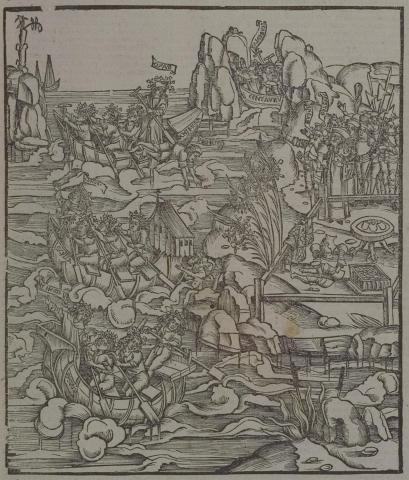Annotations
Four of Aeneas's crews compete in a ship race. On the right, prizes are displayed in a fenced-off area; these prizes include a chest of silver or gold, an ornate tripod table, and a pile of armor. Behind the prizes, Aeneas, Acestes and a crowd of Trojans and Dardans stand cheering on the contestants. At the bottom left of the image, Mnesthus sits at the helm of the Pristis [Pystris], by all appearances, in the lead in this race. Behind him, Cloanthus commands the Scylla; he is in second place, and looking for first place. He looks to the heavens and calls on the gods for aid; hearing his vows, Portunus and Phorcus push the ship from behind (233-43). In third place is the Chimera, with Gyas in command. They have lost their early lead due to the timidness of Moenetes, who did not dare to sail close to the shore for fear of rocks. Therefore, Gyas pushes Moenetes off the ship, taking his oar and steering the vessel himself (159-77). Sergestus, commanding the Centaur, has steered his ship too close to the rocks in pursuit of the win, and has crashed into some large rocks (202-9). In the upper left corner, there is an ilex (oak) branch placed on a rock; this rock represents the halfway point, at which the ships must turn back toward the shore. (Katy Purington)
Woodcut illustration from the “Strasbourg Vergil,” edited by Sebastian Brant: Publii Virgilii Maronis Opera cum quinque vulgatis commentariis expolitissimisque figuris atque imaginibus nuper per Sebastianum Brant superadditis (Strasbourg: Johannis Grieninger, 1502), fol. 234r, executed by an anonymous engraver under the direction of Brant.


Sebastian Brant (1458-1521) was a humanist scholar of many competencies. Trained in classics and law at the University of Basel, Brant later lectured in jurisprudence there and practiced law in his native city of Strasbourg. While his satirical poem Das Narrenschiff won him considerable standing as a writer, his role in the transmission of Virgil to the Renaissance was at least as important. In 1502 he and Strasbourg printer Johannes Grüninger produced a major edition of Virgil’s works, along with Donatus’ Life and the commentaries of Servius, Landino, and Calderini, with more than two hundred woodcut illustrations. (Annabel Patterson)